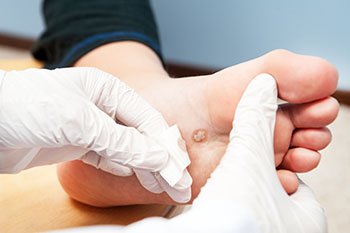How Do Plantar Warts Form?
Tuesday, 01 June 2021 00:00 Verrucae, also known as plantar warts, grow on the sole of the foot because of the human papillomavirus (HPV). This HPV virus that is usually the cause of plantar warts is contagious and thrives in warm moist environments such as swimming pools, changing room floors or community shower areas. Plantar warts will appear as a small growth with a tiny black dot in the center, and they can be painful when pinching the spot. These warts can grow up to a centimeter in diameter and may form into a cluster of multiple warts. Verrucae can be very painful, particularly when applying pressure on the foot. Patients who are struggling with a painful plantar wart should consult with a podiatrist to determine potential treatment and removal options.
Verrucae, also known as plantar warts, grow on the sole of the foot because of the human papillomavirus (HPV). This HPV virus that is usually the cause of plantar warts is contagious and thrives in warm moist environments such as swimming pools, changing room floors or community shower areas. Plantar warts will appear as a small growth with a tiny black dot in the center, and they can be painful when pinching the spot. These warts can grow up to a centimeter in diameter and may form into a cluster of multiple warts. Verrucae can be very painful, particularly when applying pressure on the foot. Patients who are struggling with a painful plantar wart should consult with a podiatrist to determine potential treatment and removal options.
Plantar warts can be very uncomfortable. If you need your feet checked, contact Dawn Miles, DPM from Florida. Our doctor will assist you with all of your foot and ankle needs.
About Plantar Warts
Plantar warts are the result of HPV, or human papillomavirus, getting into open wounds on the feet. They are mostly found on the heels or balls of the feet.
While plantar warts are generally harmless, those experiencing excessive pain or those suffering from diabetes or a compromised immune system require immediate medical care. Plantar warts are easily diagnosed, usually through scraping off a bit of rough skin or by getting a biopsy.
Symptoms
- Lesions on the bottom of your feet, usually rough and grainy
- Hard or thick callused spots
- Wart seeds, which are small clotted blood vessels that look like little black spots
- Pain, discomfort, or tenderness of your feet when walking or standing
Treatment
- Freezing
- Electric tool removal
- Laser Treatment
- Topical Creams (prescription only)
- Over-the-counter medications
To help prevent developing plantar warts, avoid walking barefoot over abrasive surfaces that can cause cuts or wounds for HPV to get into. Avoiding direct contact with other warts, as well as not picking or rubbing existing warts, can help prevent the further spread of plantar warts. However, if you think you have developed plantar warts, speak to your podiatrist. He or she can diagnose the warts on your feet and recommend the appropriate treatment options.
If you have any questions please feel free to contact one of our offices located in Palatka and Saint Augustine, FL . We offer the newest diagnostic and treatment technologies for all your foot and ankle needs.









